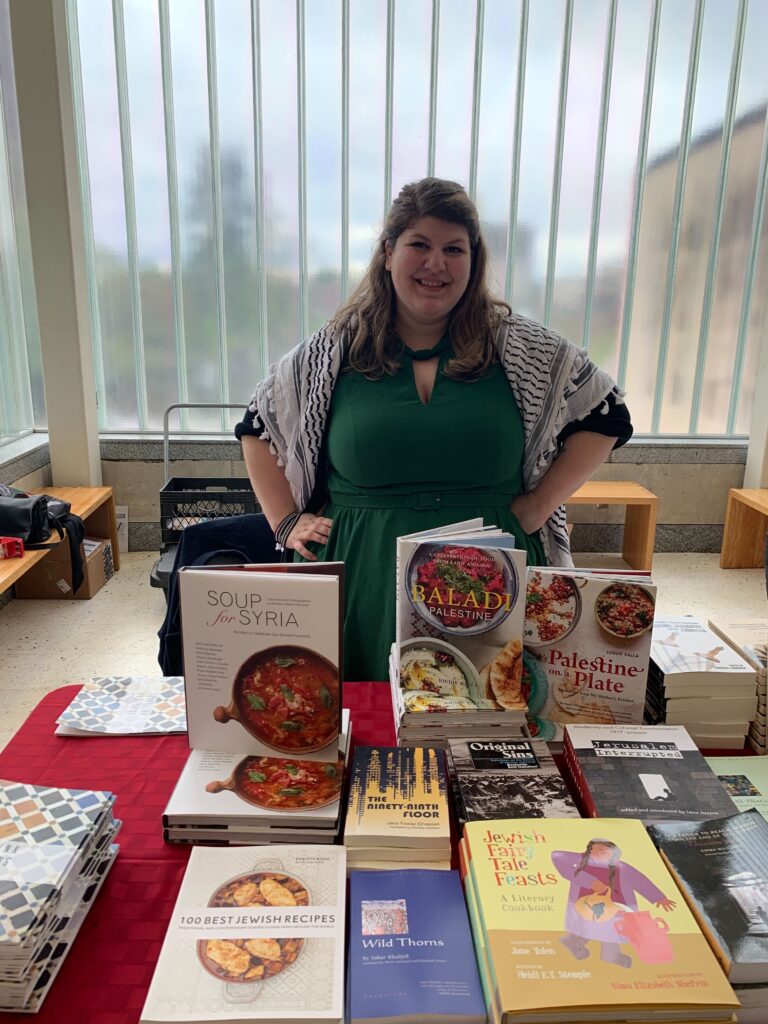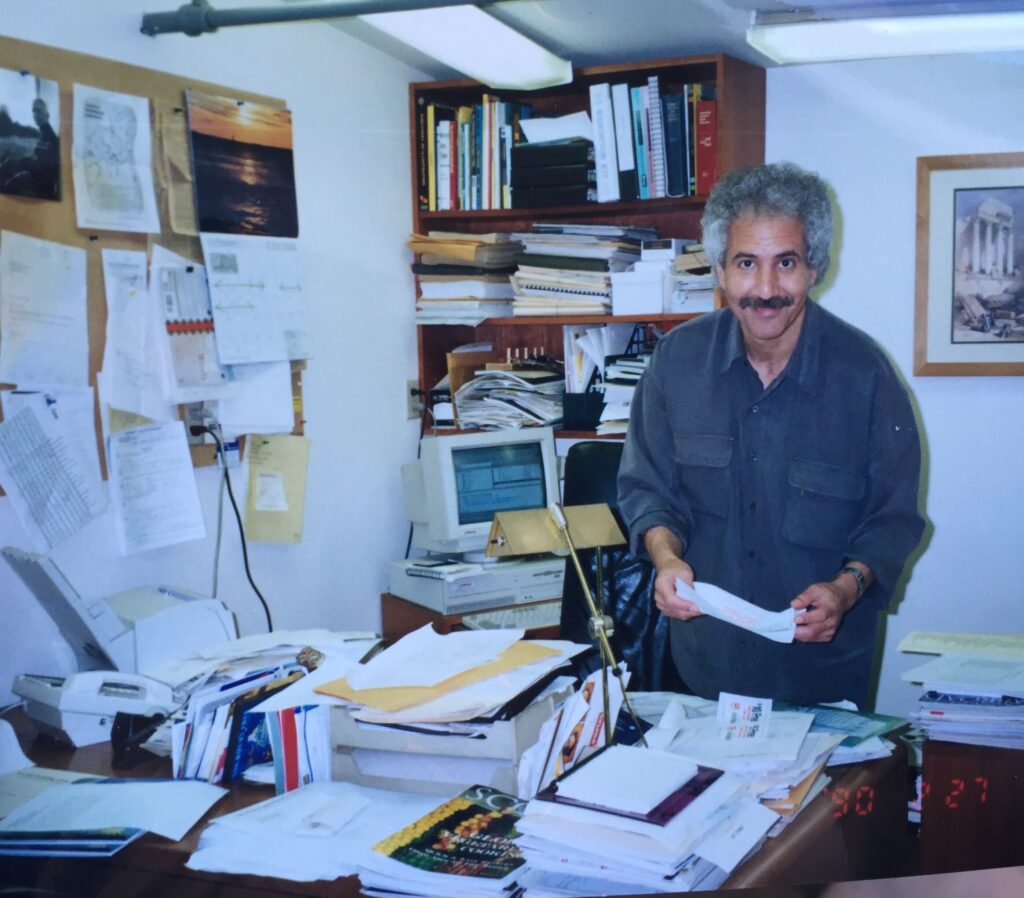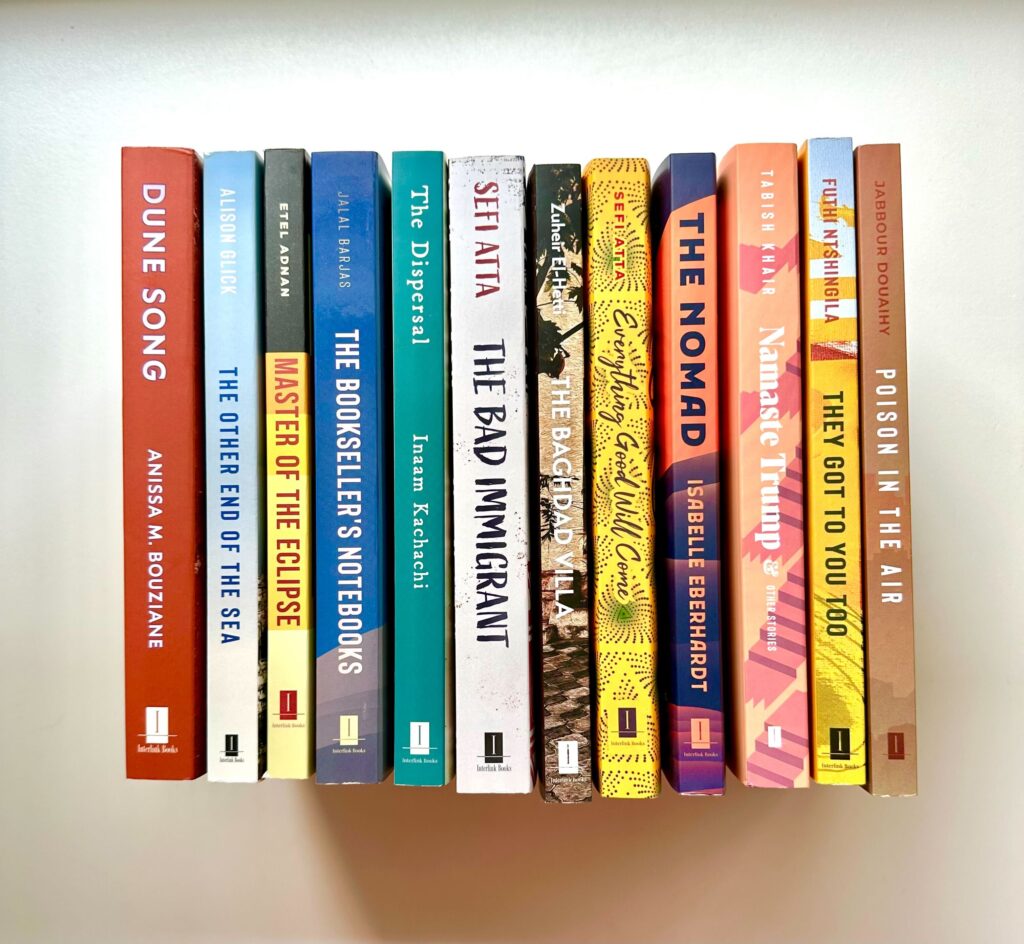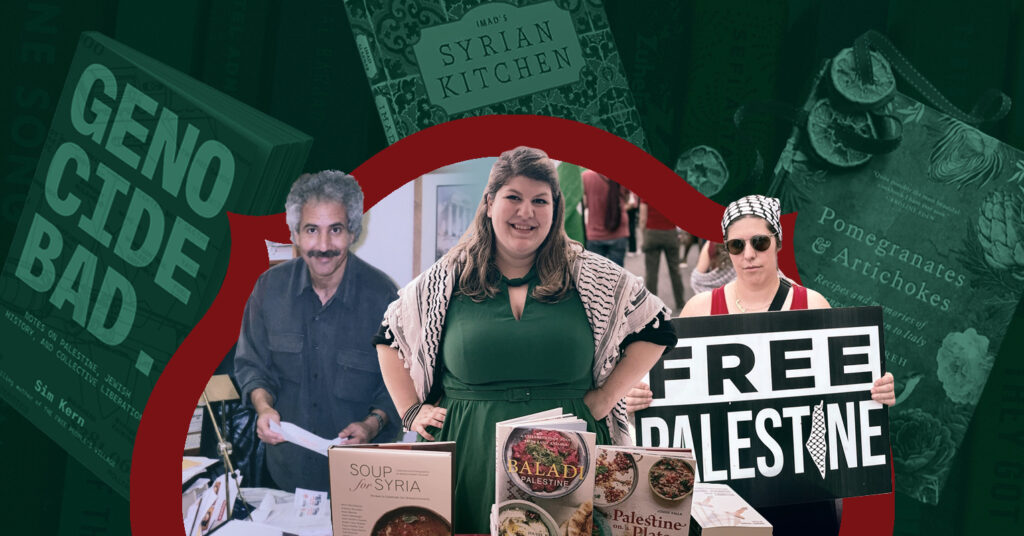“The narrative that’s been told about Palestinians is that we’re the perpetrators of violence, or that we’re terrorists,” said Hannah Moushabeck in an interview with EnVi. “It’s through literature and art that we’ve been able to advocate for ourselves and tell authentic stories.”
As a second-generation Palestinian American author, combating censorship and historical revisionism is integral to Moushabeck’s work. In July 2024, she inherited Interlink Publishing alongside her sisters Leyla and Maha, and their brother-in-law Harrison Williams. Their parents—Michel and Ruth Moushabeck—founded Interlink, the only Palestinian-owned publishing house in the United States. Today, it continues to be an unrelenting force for good in the book world. Their publishing ethos goes beyond acquiring the next bestseller, instead focusing on works from historically marginalized and misrepresented cultures. From literature-in-translation to award-winning cookbooks, Interlink’s backlist is a deep repository for global masterpieces untouched by mainstream Western publishers.
This July marked one year since the Moushabeck siblings took ownership of Interlink. Hannah, who serves as Interlink’s co-owner and marketer, spoke with EnVi about the group’s journey and the role literature takes in preserving collective memory.

Inheriting a Family Legacy
With many family members in the publishing industry, Hannah described herself as having grown up “in a book world.” After her parents immigrated to the U.S. in the 1970s, they quickly realized the need for a publishing house like Interlink. Despite the long and crucial lineage of Arabic literature and poetry, they found that none of their beloved works were being translated for English-speaking readers. In response, Michel and Ruth Moushabeck started Interlink Publishing in 1987 — the same year Hannah was born.
“There’s no part of my life where I wasn’t on the hip of one of my parents at a book fair, or playing under our booth at a conference. I was surrounded by literature,” she recounted fondly. As a result, she and her sisters found themselves “sucked into publishing” after college. Prior to inheriting co-ownership of Interlink, Hannah worked at large corporate publishing houses for a decade. In April 2023, she published Homeland: My Father Dreams of Palestine, her debut picture book and “the first mainstream corporately-published picture book by a Palestinian American in 30 years.”

Months later, following the events of October 7, 2023, Hannah witnessed a massive erasure of Palestinian voices within the professional book world. In a statement released by Publishers for Palestine on November 7, 2023, publishing workers across the world condemned “the policing and censorship of writers, the bullying and harassment of bookstore owners and staff, and the intimidation of publishing workers who are in solidarity with Palestinians.”
“It was a real offensive move to oppress and illegitimize Arab and Muslim writers in their rightful critique of the state of Israel,” Hannah elaborated. “We saw a lot of our industry turn their back on the morals that they say they stand for. So many of our books feel so important when your history is actively being erased and misrepresented.”
Refusing to be complicit, Hannah quit her corporate publishing job in New York City to join her family at Interlink. Despite knowing the challenges of keeping an independent publishing house afloat amidst the “monopoly in the book industry,” she regarded Interlink’s decades-long success as a testament to her parents’ dedication. It might have been a risk to some, but the urgency outweighed the risks.
Building a Home at Interlink
As she reflected on the most rewarding parts of working at Interlink, Hannah emphasized the team’s ecosystem of genuine, lifelong relationships. For many, supporting and publishing through Interlink goes beyond conventional metrics of success. In place of profit and popularity, the Moushabecks’ love for human connection and solidarity lights the path for authors and readers alike.
“There are people that we are working with who once changed my diapers… I think that comes from [them] admiring our refusal to back down and censor ourselves,” she shared. “Our authors are family in a way, to the point where they stay at our houses when they visit for events. [They] have published with us for decades even though they know they can go elsewhere and get more money.”
Now, Interlink stands as one of the leading publishing houses prioritizing writers of the global majority. Along with having an active backlist of over 1,000 titles, the company publishes approximately 90 titles per year under three imprints: Interlink Books, Olive Branch Press, and Crocodile Books. Aiming to counteract negative stereotypes and misrepresentations of various cultures, many of the works published through Interlink are works of translation.
“We’re mostly looking for non-Western voices. They’re not niche books, either — we are publishing some of the most prolific writers in non-Western countries. The beauty of books is that you can travel the world without ever leaving your home,” Hannah said.

Combating Historicide Through Literature
As reported by Georgetown University researcher Samar Saeed, an estimated 70,000 books were looted or destroyed by Israeli forces during the 1948 Nakba. Original photographs by leading Palestinian photographers Ali Zarour and Ibrahim Rissas were also stolen, then later discovered at Tel Aviv University’s Israeli archives. Ten years later, Israeli authorities ordered the destruction of 27,000 Palestinian textbooks predating the Nakba since the state deemed them “as either useless or threatening.”
Today, the historicide of Palestine continues to be widely documented. In November 2023, Israeli forces decimated the Gaza Municipal Library — containing thousands of historical documents spanning over a hundred years.
“When libraries are attacked, more than the horrific destruction of books is involved. Libraries are cultural repositories. They hold collective memory, preserve cultural heritage, showcase societal development and afford individuals the opportunity for learning and growth,” wrote Laila Hussein Moustafa for the Los Angeles Times.
In the face of genocide and cultural erasure, publishing works that serve to encompass Palestinian life is essential to Interlink. Hannah shared one memorable work titled Night in Gaza, a visual and written account of Dr. Mads Gilbert’s experience providing medical aid to people struck in the 2014 bombardments — a “snapshot of time in Palestine.” Looking back on the past decade since its release, Hannah noted that Gilbert’s archival work remains as crucial as ever, if not more so.
“We realized that so many of the subjects that were photographed have been martyred. So many of the buildings, streets, and neighborhoods in the communities have been destroyed,” she said. “With this new generation, our aim is to circumnavigate gatekeepers who have always kept us out in the cold. Those who have said publishing Palestinians is too controversial, too upsetting, too divisive… resistance to the mainstream and the occupation has always been central to our mission.”

Empowering the Next Generation of Readers
According to Hannah, coalition-building is another significant part of Interlink’s work. It started as a grassroots effort throughout the years, primarily by “creating community through activist circles.” However, social media has made directly reaching readers much easier. With over 46,000 combined followers on Instagram and TikTok, Interlink’s growing online community has allowed the company to access more readers than ever. Hannah found that young adults — college students especially — have information needs that their educational institutions could not meet.
In 2024, student protestors formed more than 100 encampments on college campuses across the U.S. They raised critical demands about their schools’ involvement with the genocide in Gaza, such as calling for institutional divestment from military and weapons manufacturing companies. When the Interlink team visited their nearby encampments to donate books, Hannah saw something remarkable.
Students not only stocked the encampment with food and personal care items, but also had their own libraries. This was the case for many encampments — students at the University of Michigan, for instance, set up a “Liberation Library” with books and zines on “anti-imperialism, abolition, anarchism, and the history of student politics.” As written by doctoral student Daniel Weaver, “The books in the library (gathered, read, taken away or destroyed) taught us that we might learn to let go of the disastrous illusions offered by those in power.”
Regarding what she and her team saw for themselves, Hannah reflected, “There they were, using their bodies to occupy an area, but they were all reading. It was beautiful. Their university was denying them access to information, but they were finding it themselves.”

“A Homeland Becomes a Tale”
“Sometimes a homeland becomes a tale. We love the story because it is about our homeland and we love our homeland even more because of the story,” wrote the late Palestinian poet and professor Refaat Alareer in Gaza Writes Back, an anthology of short stories from fifteen young writers in Gaza.
For some, literature is a means of escape. For others, it is how they ensure the world remembers them. Time and time again, people have used literature as a source of truth and hope in movements for liberation. Take the queercore zines of the mid-1980s for instance, which not only foregrounded queer creativity, but also organized resistance to government indifference during the AIDS crisis.
Earlier zines, too, such as Fire!! (1926) — a Black literary journal of the Harlem Renaissance — were an inspired origin point for the next generation of zine makers. From the original 20th-century zinesters to the family legacy behind Interlink, publishing independent literature has always been about more than telling a story. It points to the shared struggle against censorship, as well as the urgency of circulating ideas beyond the bounds of mainstream ideologies.
In many ways, literature is also an incendiary device that ignites faith in the hearts of communities. The poem “Identity Card” (1964) by renowned Palestinian writer Mahmoud Darwish, for example, gained prominence as a defiant declaration of Palestinian identity. The opening line, “Write it down, I am an Arab,” was used as an “anthem for protest,” particularly after Darwish was placed under house arrest for writing the poem. For Interlink Publishing, bringing works like this to a new generation of readers is more than a passion. It is a necessity.
“We have seen poetry light a fire and connect with people. They dip into their humanity through poetry,” Hannah reflected. “It’s incredibly difficult to break this hundreds of years-old model of publishing, but we’re absolutely going to try.”
Inviting readers new and old to their community, Interlink is hosting its annual Read & Resist Fest on September 20. The event will include a discount book sale, henna, poetry readings, cookbook tasting, and so much more! To keep up with events and browse Interlink’s book selections, check out their website, Instagram, and TikTok.
Interested in reading about more storytelling through an Indigenous lens? Check out EnVi’s latest piece on “Chief of War” here!




